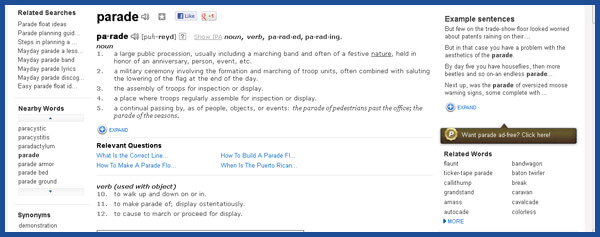Dyslexia and the Dictionary
Written by Sandie Barrie Blackley, Speech-Language Pathologist
Published on January 31, 2013

It probably won’t surprise you to learn that I love dictionaries. I like the substantial weight of a dictionary in my hand, the orderly sequence of information it provides, and its helpful tips on the usage and history of words. Plus, I like the surprise of a dictionary — how, on the way to lookup one word, you get snagged by another. If and when dictionaries go paperless, like encyclopedias, I will mourn their loss.
But in spite of my personal affection for dictionaries as books, I enthusiastically endorse the use of online dictionaries for children who struggle to read, write and spell.
Can dyslexic children learn to use and value dictionaries? Yes!

Take Dictionary.com for example. Go to the home page and right at the top, there’s a place to key in a word. Let’s use a standard second-grade reading word, parade. Type in parade, click on the little magnifying glass symbol and you’re taken to a page that shows the word, its syllables, its part(s) of speech, its definition, and, most helpful for challenged readers, a clickable audio file with a very clear pronunciation so the user can hear how the word is pronounced and relate that to the printed word. This is fabulous for dyslexics as it helps link phonology (speech sounds and rules of pronunciation) with spelling and meaning (these multiple-linguistic factors are an important component of the Orton-Gillingham approach to dyslexia treatment).
(By the way, if you happen to misspell the word in the first place, something that would not be surprising for a word-challenged reader, Dictionary.com takes you to a page with the most likely correct choices. Thus, “prade” yields a list with parade right at the top.)
Another helpful feature is built into the definition itself, although you might not notice it immediately. Mouse over the definition and you’ll see that every single word of every definition point is clickable. So in the first line of the definition of parade, you see “a large public procession…” and you can click on each of those four words (a, large, public, procession) to see/hear their definitions and pronunciations. It captures a little of that wonderful surprise element I was talking about earlier.
If you continue to scroll down the page, you’ll see a Word Origin & History section that explains the etymology of the word, as well as related word forms, quotes, images, idioms and much more.
This robust site also includes games, Word Dynamo word lists, slide shows, word-of-the-day features, and more. By signing up for a free account, your young reader can take advantage of the full array of options, plus keep a personal word list — very useful for review.
You can also get a Word of the Day app from Dictionary.com for your smartphone. It displays the Word of the Day with its brief definition and a search bar. The display takes up very little room and lives neatly and discretely on your phone’s screen. When you type a word in the search bar a slide appears to allow you to select either the dictionary or the thesaurus. The search result is the full Dictionary.com listing for that word.
Look around the internet and you’ll find a vast assortment of assistive technologies, including dictionary software, apps, electronic dictionaries, and spell checkers. But before you spend money on one of those, I urge you to explore the free options at Dictionary.com.
If your child has symptoms of dyslexia, such as difficulty reading, writing, or spelling, Lexercise can help. Take a look at our Online Dyslexia Testing and Treatment page or contact us directly at Info@Lexercise.com or 1-919-747-4557.
Improve Your Child’s Reading
Learn more about Lexercise today.
Schedule a FREE
15-minute consultation


